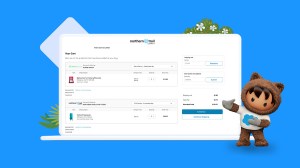Following the successful acquisition of marketplace management solution Atonit, Salesforce today announced the general availability of Commerce Marketplace, a solution that enables online commerce companies from any industry to quickly create, manage, and scale a unique, digital marketplace on Commerce Cloud.
Why it’s relevant: Marketplaces offer online retailers an opportunity to gather first-party data, drive hyper-personalized digital experiences, and new, relevant products to their customers.
- In the State of Commerce report, 37% of commerce organizations say that launching their own marketplace is a priority over the next two years.
- This growth extends beyond standard retail and consumer goods brands with 45% of insurance or banking companies prioritizing building their own digital marketplace, according to the same report.
Innovation in Action: With Commerce Marketplace, brands can:
- Diversify revenue streams by leveraging third-party sellers to fill in gaps in a product catalog without the associated costs of manufacturing inventory. For example, a cosmetics company can offer hair care products and tools from other brands to serve the diverse beauty needs of shoppers.
- Boost profitability through earning commissions from third-party sellers on their marketplace channel. For example, a bank could earn commissions on sales made through its marketplace loyalty program partners for entertainment and travel.
- Reduce inventory risk and avoid the potential of out-of-stock products by offering alternatives from other companies or relevant brands. If a retail company is experiencing supply chain disruptions on a line of boots, they can showcase similar boots or even the same brand from third-party sellers.
- Build a one-stop shop for customers with an encompassing view of all their products in a single cart — including shipping estimates — regardless of the seller. A woman’s apparel company, for example, could offer an “endless aisle” by selling more categories outside of their typical products, like electronics or sustainable home goods.
- Gain customer insights and loyalty with opportunities to gather additional first-party data from search and shopping behaviors on newly-offered products and services. A fitness brand can determine a customer’s level of interest in new exercise classes based on their purchases made through its fitness gear marketplace.
The Salesforce perspective: “From financial services to consumer goods, businesses in every industry can benefit from marketplace capabilities. Commerce Marketplace makes it easier for shoppers to find and discover products related to the ones they already love while helping online retailers unlock new revenue channels and new relationships,” said Scot Gillespie, GM of Commerce Cloud.
The customer perspective: “We’re excited about the opportunity presented by Salesforce’s new Commerce Marketplace as we seek out new avenues to retain and maintain relevance with our customers. Having already leveraged the power of Salesforce in the past, we are confident in the company’s robust set of connected commerce solutions and believe Commerce Marketplace will enable us to scale the power of our brand, both for our current customers and for future partners,” said Fernanda Sanzovo Prado, Management Board at Jaú Serve Supermercados, a Brazilian supermarket chain.
Explore More:















